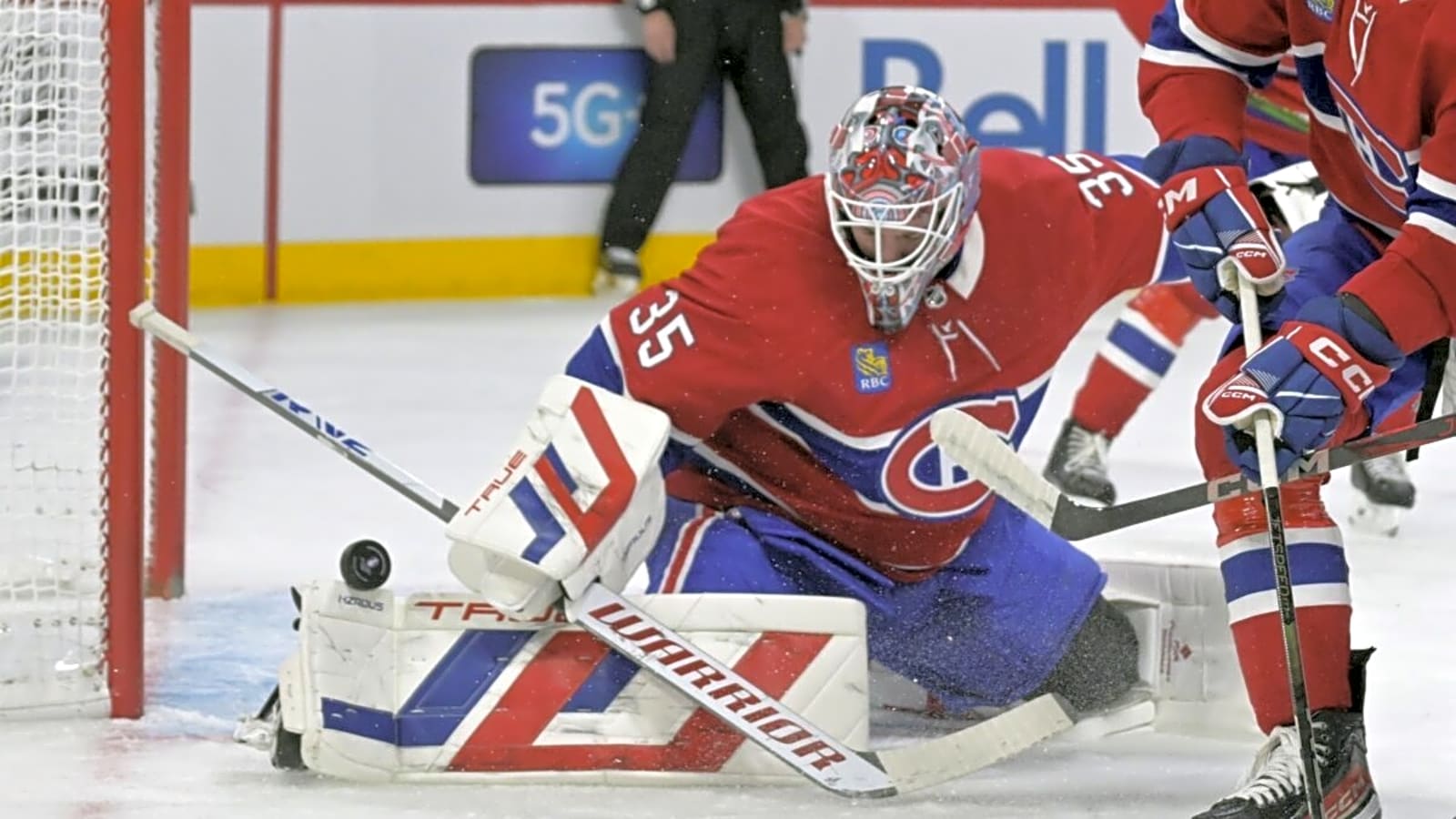
The Montreal Canadiens enter the 2025-26 season with a far more intriguing crease situation than in years past. Last season, Samuel Montembeault carried the bulk of the load, starting 60 games. Behind him, however, the backup spot was a revolving door, with shaky play forcing Montembeault into more starts than ideal. This season, with both Kaapo Kahkonen and Jakub Dobes in the mix, the organization hopes for a more stable tandem that eases the pressure on Montembeault while also setting the stage for the future.
Samuel Montembeault
Montembeault proved last season that he can handle the workload of a full-time starter. His 62 appearances and 31-24-7 record highlighted his durability and consistency, even behind a Canadiens roster that was still developing. Heading into 2025-26, though, it would be surprising if he were leaned on quite as heavily. With improved depth across the board and a more reliable second goaltender, Montembeault’s usage should fall closer to 50 starts.
A realistic projection for him is a 28-20-7 record, across 55 starts, which keeps him comfortably above .500. The Canadiens are expected to take another step forward defensively, which should reflect in Montembeault’s personal numbers. With a stronger blue line featuring Lane Hutson entering his sophomore season, Noah Dobson’s first year in Montreal, and Kaiden Guhle continuing to grow into a shutdown role, Montembeault should benefit from cleaner breakouts and reduced high-danger chances against.
Statistically, Montembeault can be expected to hover around a 2.75 goals-against average and a .905 save percentage. Those are good numbers, enough to keep Montreal competitive most nights. More importantly, if Montembeault sustains that level of play, he’ll once again be in the conversation for a spot on Team Canada at the 2026 Winter Olympics in Milan.
The Battle for Number Two
While Montembeault’s role is defined, the real intrigue lies in the backup battle. Kahkonen, brought in for his NHL experience, enters camp looking to re-establish himself after an uneven run these last few years. His track record as a serviceable NHL backup gives him the inside edge, especially for a team like Montreal that can’t afford instability behind Montembeault. However, Dobes is not going away quietly. The young netminder gained valuable experience last season in Laval and NHL action, showing flashes of his long-term potential.
For head coach Martin St. Louis and the Canadiens’ staff, this decision will likely come down to balancing short-term stability with long-term development. Kahkonen represents the safer option: he’s a known commodity who can shoulder the backup load without overexposing Montembeault. Dobes, meanwhile, represents the future. Giving him a full NHL season as the number two could accelerate his progression and test whether he’s ready for a larger role down the line.
Backup Stats Projection
Predicting stats for a backup goaltender is always tricky, and in Montreal’s case, it’s even more difficult given that the identity of the number two is still unsettled. What is clear, however, is that Montembeault should not be asked to start 60-plus games again. With a healthier, more experienced tandem, the Canadiens will look to spread the load more evenly.
If Montembeault is penciled in for around 55 games, that leaves approximately 27 starts for the backup role. A record of 13-12-2 seems like a fair projection for that share of games. Whether those numbers belong to Kahkonen, Dobes, or a split between the two, the expectation should be that Montreal gets steadier play than they did last season. That stability would be a quiet but important boost to their playoff hopes. Instead of running Montembeault into the ground, the Canadiens could trust their backup to deliver league-average performances and keep the team competitive.
The Canadiens enter 2025-26 with a clear starter in Montembeault and, for the first time in years, a legitimate competition for the backup role. That competition is healthy for the organization: it gives Montreal short-term insurance with Kahkonen while also leaving the door open for Dobes to prove himself. The most important outcome, however, is that Montembeault won’t have to repeat the heavy 62-game workload he shouldered last season. A more balanced crease means a fresher number one, a more prepared backup, and a Canadiens team that can stay competitive throughout the grind of the season.
If Montembeault can deliver around 55 starts with stable numbers and the backup provides consistent support, Montreal’s goaltending will no longer be a question mark but rather a steadying presence. And for a team on the rise, that could make all the difference.
More must-reads:
- Five biggest disappointments from first month of NHL season
- Five biggest surprises from first month of NHL season
- The 'TDs from Josh Allen or Patrick Mahomes' quiz
Breaking News
Trending News
Customize Your Newsletter
 +
+
Get the latest news and rumors, customized to your favorite sports and teams. Emailed daily. Always free!








